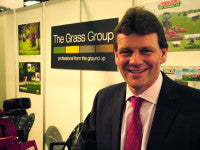Does cheapest really mean ‘Best Value’?
 This current economic situation is leading buyers into a false sense of cost effectiveness.
This current economic situation is leading buyers into a false sense of cost effectiveness.
With limited budgets, brought about by cut backs or falling revenues, the simple choice is to either to buy the cheapest or stop spending. Both wrong decisions in my view.
Spending nothing is a non starter as to fail to maintain a playing surface is absolute folly. Letting a surface deteriorate will only cost more in the long run to bring it back to peak condition. If the organisation relies upon revenue from paying guests, then the more unmaintained the facility gets the quicker those guests will leave to find a better venue.
Double jeopardy.
If the lowest cost option is selected then one has to ask why is machine A cheaper than machine B? Buying the cheapest leaves one open to an inferior product; little or no customer service; no residual value and possibly an upset dealer you've relied upon for several years to help you out, and loan you bits of kit when you're stuck.
Double jeopardy again.
But that's what's happening in our industry more and more these days. We hear from dealers and manufacturers alike that Greenkeepers are going to their Committees with machinery or material requirements only to be put in an awkward position of being sent away to 'get it cheaper'. It would seem that the members constantly want something for nothing.
Buying the cheapest is not new; some years back local authorities adopted the buying philosophy of 'Compulsive Competitive Tendering (CCT)' - in other words 'buy the cheapest'. CCT was abandoned in 1998 by the government of the day with the following announcement:
Under Compulsory Competitive Tendering, service quality has often been neglected and efficiency gains have been uneven and uncertain, and it has proved inflexible in practice. There have been significant costs for employees, often leading to high staff turnover and the demoralisation of those expected to provide quality services.
Compulsion has also bred antagonism, so that neither local authorities nor private sector suppliers have been able to realise the benefits that flow from a healthy partnership. All too often the process of competition has become an end in itself, distracting attention from the services that are actually provided to local people. CCT will therefore be abolished (DETR 1998, s.1.5).
Imagine how demoralising it would be to be pilloried by the members for not providing the best greens when it's not your fault, but the fault of your machinery - a bad workman and all that. You're never going to be believed so it would be much better to just leave.
Greenkeepers and Golf Course committee members need to take a leaf out of the local authorities' book and look at their procurement practice and become more commercially aware. CCT has now been replaced by 'Best Value' - in other words not the cheapest but the best overall taking into account several criteria.
Cost is only one element. Of course one should not pay over the odds for a piece of kit, but one should compare like with like and expect to pay for quality and service. Ultimately driving the cost down may lead to less competition and being held to ransom in the long run. With little or no margin how can clubs expect to get the same level of service and after sales support from a local dealer?
It can't be done and the point needs to be made that there is a cost attached to having your dealer come out at the drop of a hat when called to sort out a mechanical problem. That sort of service has been included up till now but may have to be charged for in the future. A couple or three call outs and that 'cheap' machine will cease to be 'cheap'.
Is this really 'Best Value'?
The Grass Group, Wadebridge Farm, Landwade, Exning, Newmarket Suffolk CB8 7NE UK
Tel: +44 (0) 1638 720123 - Fax: +44 (0) 1638 720128 - www.thegrassgroup.com
